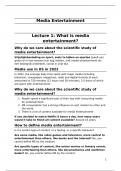Class notes
College aantekeningen media entertainment alle tentamenstof
- Course
- Institution
Ben je op zoek naar een duidelijke en complete samenvatting van het vak Media & Entertainment? Deze samenvatting bevat álle belangrijke theorieën, concepten en voorbeelden die je nodig hebt om je tentamen succesvol te maken. Met gestructureerde uitleg over onderwerpen zoals mediaconsumptie, motiv...
[Show more]



